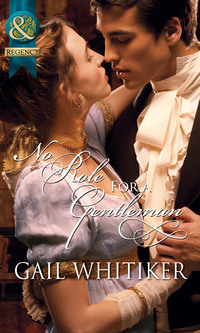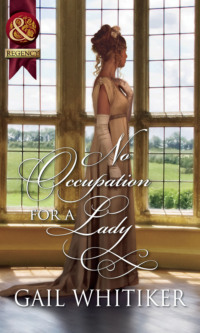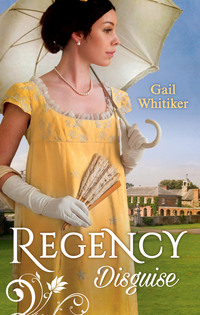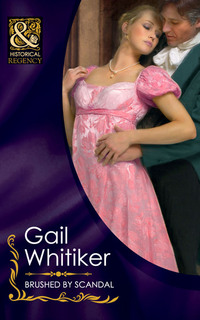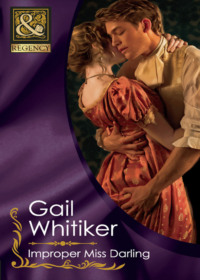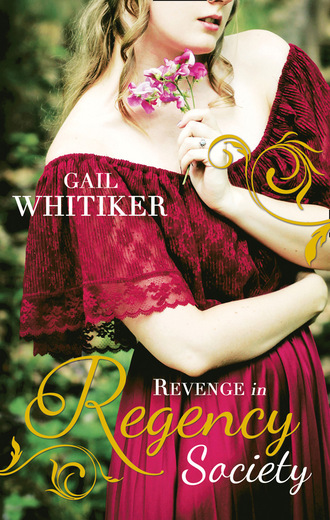
Полная версия
Revenge In Regency Society
Goodness, who would have thought that with just one look, he could make her feel as awkward as a schoolgirl, as young and as gauche as Miss Mercy Banks. Surely as a mature woman of twenty-four, she knew better than to encourage the attentions of a man she’d only just met …
Anna dipped her head and boldly returned his smile. No, clearly she did not. But as she opened her fan and reluctantly turned away, the knowledge that a handsome man whose name she didn’t know still had the power to make her blush was more than enough to keep the smile on her face for the rest of the evening.
‘Parker, have you heard anything I’ve said?’ Colonel Tanner demanded in a harsh whisper.
‘Every word, Colonel.’ Sir Barrington Parker’s expression didn’t change, though he was careful to pull his gaze from the face of the exquisite young woman who had just smiled at him across the room. No small feat for a man who appreciated beauty as much as he did. ‘You wish me to investigate the disappearance of your mistress—’
‘I never said she was my mistress!’ the older man blustered.
‘There was no need. Avoiding my eyes while you described her told me all I needed to know,’ Barrington said smoothly. ‘She is approximately twenty years old, slim, with dark brown hair and rather startling green eyes. The last time you saw her she was wearing a pale blue gown with a white shawl and a bonnet with either blue or black ribbons.’
The older man grunted. ‘Apologies. Just don’t like blathering on to a man who doesn’t appear to be listening.’
‘I wouldn’t accomplish much if I didn’t listen, Colonel,’ Barrington said, though in truth he hadn’t been paying as much attention as he should. Through the mirror on the wall behind Tanner, he had been watching Lady Annabelle Durst attempt to play matchmaker. She had waited until Lieutenant Giles Blokker was in the midst of a small group of people with whom she was obviously acquainted and had sought the necessary introduction. Then, as the other couples had drifted away, she had engaged Lieutenant Blokker in conversation, no doubt with the intent of bringing Miss Banks’s name into the discussion.
At that point, Barrington had seen a look of cautious optimism appear on Blokker’s face, followed moments later by one of genuine happiness. When Lady Annabelle turned and started in the direction of Miss Banks and her mother, the young pup had fallen into step behind her, clearly delighted that he was on his way to being formally introduced to the young lady who had captured his heart.
‘Where did you last see Miss Paisley, Colonel?’ Barrington asked, reluctantly dragging his attention back to the matter at hand.
‘Hogarth Road. I keep a house there. Nothing elaborate, you understand,’ the Colonel said gruffly. ‘Just a place for friends to use when they come up to London.’
Barrington nodded. He knew exactly what the house was used for and it certainly wasn’t the convenience of friends. ‘I shall make enquiries. Where can I reach you?’
‘Best send a note round the club. Wouldn’t do to have anything come to the house.’
Barrington inclined his head. Though most wives knew about their husbands’ affairs, none wanted proof of them showing up at their front doors. ‘As you wish.’
‘Look here, Parker, it’s not what you think,’ the Colonel said, clearing his throat. ‘Eliza’s not like the rest of them. She worked as a lady’s maid in a respectable establishment until the eldest son took a fancy to her. When she was turned off without references, one thing led to another until she ended up in a brothel. That’s where I met her,’ he said, again not meeting Barrington’s eyes. ‘She told me her story and naturally I felt sorry for her, so I asked her if she’d like to come and work for me. I knew Constance was looking for a new maid and I thought it might be a way of getting Eliza back into respectable employment.’
Barrington’s smile was purposely bland. ‘And did your wife agree to take Miss Paisley on?’
‘She did, but it wasn’t long before she realised there was something going on and I had to let Eliza go,’ the Colonel said regretfully. ‘Felt so damned guilty, I offered to put her up at the house on Hogarth Road until she was able to find something else.’
With the small stipulation, Barrington surmised, that she become his mistress while she was there. A gentleman’s altruism only extended so far. ‘It would seem Miss Paisley has much to be grateful to you for, Colonel.’
‘I thought so, which was why I was so surprised when she left without telling me,’ the Colonel said. ‘Bit concerned, if you know what I mean.’
Barrington did know and he wasn’t surprised. Tanner was a decent chap, somewhere in his mid-fifties, with four married children and eight grandchildren. His wife had been in poor health for the last five years and, though he was devoted to her in every other way, her ill health had prevented them from enjoying a normal marital relationship. So he had turned, as so many men did, to the ranks of the demi-monde and there he had encountered Miss Elizabeth Paisley, the young woman for whom he had developed an unfortunate affection. Now she was missing and the Colonel was worried about her.
Probably with good reason, Barrington thought as he shook the man’s hand and walked away. It was a simple fact that women of Miss Paisley’s ilk were concerned with one thing and one thing only. Survival. It wasn’t easy making a living on the streets of London. A woman never knew if the man who pulled her into a darkened alley and threw up her skirts was going to be a paying customer or the last man she ever saw alive. Being a prostitute was not without its risks. But being the mistress of a wealthy man took away those risks and gave a woman security. It put a roof over her head and kept food on her table. So why would someone like Miss Paisley walk away from all that if she’d had any other choice?
It was a question Barrington couldn’t answer. And as he prepared to leave Lady Montby’s reception—after deciding it was best that he not stop to engage the delightful Lady Annabelle in conversation again—he realised it was one that would trouble him until he did. To that end, he made a mental note to ask his secretary to make some initial enquiries into Elizabeth Paisley’s whereabouts. Sam Jenkins had been with Barrington long enough to know what kind of questions to ask and who to ask them of. Then, depending on what he turned up, Barrington would either call upon one of his extensive network to continue the investigation or delve into the matter himself.
He wasn’t sure why, but as he climbed into his carriage for the short ride home, he had a feeling there was more to the disappearance of Miss Elizabeth Paisley than met the eye.
Chapter Two
Anna pulled her dapple-grey mare to a halt by the base of a large oak and waited for Lady Lydia Winston to catch up with her. The two had made a point of riding together on Tuesday and Thursday mornings, and these rousing canters had become one of the highlights of Anna’s week. Lady Lydia, daughter of the Marquess of Bailley, was by far one of the most amusing and interesting people Anna had ever met.
‘Goodness!’ Lydia said as she drew her spirited Arabian bay level with Anna’s mare. ‘I was sure I had you at the big tree, but you sprinted past me as though I was standing still!’
‘I suspect Danby put oats in Ophelia’s bucket this morning.’ Anna reached down to give the mare’s glossy neck an affectionate pat. ‘She’s not usually that quick off the mark.’
‘Nevertheless, I had enough of a lead that it shouldn’t have made a difference. Tarik isn’t used to being left behind.’ Lydia’s ready smile flashed. ‘I won’t be so easily fooled the next time.’
Anna laughed, pleased that her little mare had done so well. She nudged her to a leisurely walk, content to enjoy the glorious morning sunshine and the relative emptiness of the park. During the fashionable hour, the avenue they were now travelling would be crowded with elegant carriages and their equally elegant passengers, but at this time of day it was the perfect place to enjoy a brisk canter.
‘By the by, have you heard the news?’ Lydia enquired.
‘That depends. All I heard at Lady Montby’s reception last week was that Cynthia Wicks had threatened to run away if her mother forced her to spend a month with her grandmother in Scotland.’
‘Good Lord, so would I,’ Lydia declared. ‘Lady Shallerton is a cold fish with whom I wouldn’t wish to spend an hour, let alone a month. But it wasn’t Miss Wick’s escapades I was referring to. It was the Baroness Julia von Brohm’s.’
‘Baroness von Brohm,’ Anna repeated slowly. ‘Should I know her?’
‘La, Anna, where have you been? It is all about town that the Viennese baroness has come to London to find a new husband.’
‘Why? What happened to her old one?’
‘He died. Almost two years ago now, leaving her a very lonely but extremely wealthy young widow. Apparently, he showered her with the most glorious jewellery and she was heartbroken when he died. Not because he gave her jewellery,’ Lydia was quick to say, ‘but because they were genuinely in love. But she is finished with her mourning now and has come to London to start a new life. I understand she’s taken a very fine house in Mayfair and is in the process of redecorating it from top to bottom.’
‘I’m surprised she would have chosen to leave Vienna at such a time,’ Anna remarked. ‘One would think she would prefer to stay with her family and friends.’
‘Friends I’m sure she has, but again, rumour has it that her only brother moved to America when she was quite young and hasn’t been heard from since. And both of her parents are dead.’
‘How tragic. What about her late husband’s family?’ Anna asked.
‘Apparently, they were never close. Difficulties with the mother-in-law, from what I hear.’
‘So Vienna is full of unhappy memories and the arms of her family hold no welcome. No wonder she decided to come to London,’ Anna said. ‘Has she any close friends here?’
‘I don’t believe so. Society is wildly curious about her, of course, but it hasn’t exactly thrown open its doors in welcome.’
‘Then we must be the first to do so,’ Anna said without hesitation. ‘I suspect once people see the daughters of the Marquess of Bailley and the Earl of Cambermere welcoming her, the rest of the doors will open soon enough. All it takes,’ she added with a knowing smile, ‘is that first little push.’
Barrington’s sword flashed once, cutting a smooth silver arc through the air and echoing down the length of the long gallery. Metal slid along metal as the two men moved through the orchestrated dance of extend, lunge, parry and retreat, and while concentration was etched on the faces of both men, only Barrington’s brow was dry. He feinted to the left, drawing his brother-in-law’s blade wide and ultimately opening him up to defeat.
‘Damn it!’ Tom Danvers snapped as the point of Barrington’s sword flicked his chest for the fifth time. ‘You’ve beaten me again!’
‘And I will continue to do so if you do not apply yourself more keenly to the sport,’ Barrington said, drawing back. ‘You won’t stand a chance if you keep both feet firmly planted on the ground, Tom. You need to keep moving. Dance on the balls of your feet.’
‘Oh, yes, that’s easy for you to say,’ the other man complained good-naturedly. ‘I’ve three stone and five years on you and it’s not so easy being nimble when you’ve more weight below your waist than above it!’
Barrington laughed. ‘Then tell that pompous French chef of yours to start preparing less fattening meals.’
‘What? And have him quit because I had the audacity to tell him what to cook! Jenny would have my head. Monsieur Etienne is the finest French chef in London!’ Tom exclaimed.
‘Be that as it may, he is not doing you any favours by serving all those heavy sauces and rich desserts,’ Barrington pointed out. ‘If you wish to be quicker on your feet, the weight will have to come off. In fact, I have a solution.’
‘I’m not sure I wish to hear it,’ Tom muttered.
‘Of course you do. I shall take Monsieur Etienne off your hands for a few weeks and you can have Mrs Buckers. I guarantee your clothes will fit better after only three days.’
‘Perhaps, but I won’t care because Jenny will have left me.’
Barrington clapped his brother-in-law on the back. ‘A man must sacrifice for his sport. Ah, there you are, Sam. Has my two o’clock appointment arrived?’
‘Not yet, Sir Barrington,’ the secretary said, ‘but another gentleman has and is asking to see you. I put him in your study.’
Barrington nodded. A visitor in his study meant one of his network had come in with information. Friends he welcomed in the gold salon. Any one else was made to wait in the hall until he had ascertained the nature of their business. He did not purport to be a private investigator, but, because of his past successes, there were those who sought him out regardless.
‘Thank you, Sam. Tell the gentleman I shall be there directly.’ He turned to smile at his brother-in-law. ‘Sorry to cut it short, Tom …’
‘No need to apologise. You’re a busy man, and, in truth, I’ve taken all the humiliation I can for one day,’ Tom said good-naturedly. ‘Before I go, however, Jenny wanted me to find out if you were available for dinner one night this week. She misses you dreadfully and even young George was heard to say it has been a great deal too long since his Uncle Barr came to play with him.’
Barrington’s pleasure was unfeigned. ‘Tell my sister I shall make a point of coming one evening this week, and then inform my nephew that I shall be sure to arrive early enough to play two games of hide and seek with him.’
‘He will not sleep for the knowledge,’ Tom said, starting for the door. ‘By the by, I should warn you that you won’t be the only guest.’
Barrington groaned. ‘Don’t tell me Jenny’s matchmaking again?’
‘I’m afraid so.’
‘Who is it this time?’ He sighed.
‘Lady Alice Stokes.’
Barrington dug into his memory. ‘Lady Alice—?’
‘Stokes. Eldest daughter of the Earl of Grummond,’ Tom supplied helpfully. ‘Beautiful, cultured and an heiress in her own right. Jenny thinks she would be perfect for you.’
‘That’s what she said about the last three ladies she introduced me to and they were all unmitigated disasters.’
‘True, but at least you wouldn’t have to worry about Lady Alice marrying you for your money. Or for your title,’ Tom pointed out.
True enough, Barrington conceded. An earl’s daughter could do much better than a baronet, and if she had her own money, his wouldn’t be as much of an attraction. ‘Very well, you may tell my sister I shall come on Friday. That should give her ample time to put everything in place.’
‘You’re a brick, Barrington,’ Tom said in relief. ‘I was afraid you’d bow out if I told you the truth, but I didn’t like the idea of you being caught off guard.’
‘Rest assured, I shall be the perfect guest,’ Barrington said. ‘And you need not fear retribution from my sister. I shall act suitably surprised when the beautiful Lady Alice and I are introduced.’
‘You are a gentleman in every sense of the word.’
‘Just don’t let me hear any mention of the words engagement or marriage or I shall be forced to renege on my promise,’ he warned.
Tom grinned. ‘I shall do my utmost to make sure you do not.’
They parted on the best of terms; Tom to return to his happy home, Barrington to return to his study to find out what new information had come to light. While there might be more comfort in the former, he was not of a mind to complicate his life by taking a wife. Investigating the underhanded dealings of others was hardly conducive to forming intimate relations with gently reared young ladies. It was neither the occupation of a gentleman nor what he’d planned on doing when he’d returned to London after his father’s death.
However, when an unfortunate set of circumstances involving two of his father’s friends and a large sum of money had forced him into the role, Barrington had discovered a unique talent for uncovering the hidden bits of information others could not. His carefully cultivated network of acquaintances, many of whom held positions of power and even more who held positions of knowledge, made it easy for him to find out what he needed to know and, over time, he had established himself as a man who was able to find solutions for people’s problems.
Naturally, as word of his reputation had spread, so had his list of enemies, many of them the very men he had helped to expose. Beneath society’s elegant and sophisticated façade lurked a far more dangerous element—one comprised of men to whom honour and truth meant nothing. Men who were motivated by greed and who routinely committed crimes against their fellow man.
Hence Barrington’s wish to remain single. While he could be reasonably assured of his own safety, he knew that if his enemies tried to get to him through the woman he loved, he would have no choice but to comply with their demands. The unscrupulous did not trouble themselves with morals when it came to getting what they wanted.
That’s why he had taken to avoiding situations that might place him in such an awkward situation. He existed on the fringes of society, close enough to be aware of what was going on, but far enough away that he wasn’t seen as potential husband material. So far it had worked out well, much to the annoyance of his happily married sister. He was able to assist the people who came to him with problems, while avoiding the complications that came with marriage.
Now, as he headed to his study, Barrington wondered which of the sins was about to be revealed and who would be thrown out of Eden as a result. Paradise was sometimes a very difficult place in which to live.
‘Ah, Richard,’ he said, opening the door to see his good friend, Lord Richard Crew, standing at the far end of the room, his attention focused on a particularly fine painting by Stubbs that covered a large part of the end wall. ‘Still hoping I’ll sell it to you?’
‘Hope has nothing to do with it,’ Crew murmured. ‘Eventually, I’ll name a price you won’t be able to refuse.’
‘Don’t be too sure. I’ve rejected every offer you’ve put forward so far.’
‘Fine. I’ll make you another before I leave today.’
Barrington smiled as he moved towards his desk. Lord Richard Crew was an ardent lover of horse flesh and owned more paintings by Stubbs, Tillemans and Seymour than any other gentleman in London. Quietly picking them up as they came available for sale, he had amassed an impressive collection—with the exception of Whistlejacket, a magnificent painting of a prancing Arabian thoroughbred commissioned by the Marquess of Rockingham and acknowledged by many to be one of Stubbs’s finest. That was the piece of work currently hanging in Barrington’s study, and the fact that he owned the one painting his friend wanted more than any other was a constant source of amusement to him and an ongoing source of irritation to Crew.
‘Did it ever occur to you,’ Barrington asked now, ‘that money doesn’t enter into it?’
‘Not for a moment,’ Crew said, finally turning away from the canvas. ‘Every man has his price and it’s only a matter of time until I find yours. But rest assured, I will find it. And I know exactly where I’m going to put Whistlejacket once I finally wrest it from your iron grip.’
Barrington smiled. ‘And where might that be?’
‘In my study, opposite my desk. That way I’ll see it when I’m working.’
‘I would have thought you’d want it in your bedroom.’ Barrington moved to the credenza and poured brandy into two glasses. ‘That way, you’d see it most of the time.’
‘True, but I would only be paying it half as much attention.’ Crew’s smile widened into a grin. ‘After all, there are so many other pleasurable things to occupy oneself with in the bedroom, wouldn’t you agree?’
The question was rhetorical. Lord Richard Crew’s reputation as a lady’s man was honestly come by because, in point of fact, Crew adored women. He had ever since a buxom dairy maid had introduced him to the pleasures of Venus in the loft of his father’s barn, followed in quick succession by three of the housemaids, two of the village shop girls, and a married woman Crew had steadfastly refused to name.
As he’d grown into a man, his appreciation for the fairer sex had not waned, but out of respect for his parents, he’d left off tupping the household servants and moved on to ballet dancers and actresses. He had steadfastly avoided marriage and refused to trifle with virgins or débutantes, saying it was a matter of pride that he had never deflowered an innocent or given false hope to a well-born lady. And once it became known that he preferred his women uncomplicated and experienced, the list of married ladies willing to accommodate his voracious appetite grew.
Hence Barrington’s surprise when, during the investigation of the Marchioness of Yew’s infidelity, he’d learned that his good friend was finally in honest pursuit of the lady’s very respectable and exceedingly lovely nineteen-year-old daughter, Rebecca.
‘Sexual conquests aside, dare I hope you’ve come with news about the identity of Lady Yew’s alleged lover?’ Barrington enquired.
‘Nothing alleged about it.’ Crew strolled towards the desk and picked up a glass in his long, slender fingers. ‘I happened to be in the lady’s house on the occasion of the young man’s last visit and saw them acting very lover-like towards one another.’
‘How convenient. Were you there in hopes of seeing the lovely Lady Rebecca or to question the mother?’
‘Most definitely the former.’ Crew raised the glass to his nose and sniffed appreciatively. ‘Unlike our young Romeo, I have no interest in romancing ladies over the age of thirty. The bloom has long since gone from that rose.’
‘But with maturity comes experience,’ Barrington said, reaching for his own glass. ‘A gently reared miss of nineteen will know nothing of that.’
‘Fortunately, I am more than willing to teach her all she needs to know.’ Crew swallowed a mouthful of brandy, pausing a moment to savour its flavour before sinking into a chair and resting his booted feet on the edge of the desk. ‘However, returning to the matter at hand, the gentleman in question is not our typical Lothario. I’ve never heard his name mentioned in association with lady or ladybird; in truth, I’d never heard of him until his arrival in London just over a month ago. So the fact he has chosen to dally with a marquess’s wife is somewhat unusual.’
‘Are you sure they are lovers?’
Crew shrugged. ‘Lady Rebecca confided her belief that they are. She told me she’s seen the gentleman enter her mother’s private quarters on more than one occasion, and, as I was leaving, I saw them myself going upstairs together hand in hand.’
‘Damning evidence indeed,’ Barrington said. ‘And reckless behaviour for a man newly arrived in London. Does he suffer from a case of misplaced affection or unbridled lust?’
‘Knowing the marchioness, I suspect the latter,’ Crew said in a dry voice. ‘It’s well known she favours younger men because her husband is a crusty old stick twenty-five years older than she is.’
‘Still, she has charmed a legion of men both younger and older than herself, and, up to this point, her husband has always been willing to turn a blind eye,’ Barrington said. ‘For whatever reason, he is not inclined to do so this time.’
Crew shrugged. ‘Perhaps he fears a genuine attachment. It’s all very well for a woman to take a lover to her bed, but it is extremely bad taste to fall in love with him. People have been known to do abysmally stupid things in the name of love.’
‘Too true. So, who is the poor boy Lord Yew is going to flay?’
‘His full name is Peregrine Tipton Rand.’
‘Good Lord. Peregrine Tipton?’
‘A trifle whimsical, I admit, but he’s a country lad visiting London for the first time. Apparently, his father owns a farm in Devon. Rand’s the oldest of four brothers and sisters but he hasn’t shown much interest in taking over from his father. Seems he’s more interested in books than in bovines, so when the mother died, the father shipped him up here to stay with his godfather in the hopes of the boy acquiring some town polish. Unfortunately, all he acquired was an affection for Lady Yew.’


